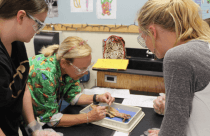What Makes a Good Research Supervisor?

Understanding Expectations
For research supervisors, the role is assigned as part of a broader and more complex faculty role that may include teaching responsibilities, administrative committee assignments, research development, and the fundraising and writing tasks that can accompany that research. In that context, being a supervisor may not be perceived as such a central role as it may for the supervisee.
For research supervisees, the expectations they may have of their respective supervisors can often be guided by good or bad experiences with prior supervisors, but they will typically include such variables as commitment, accessibility, regularity of communication, and supportiveness.
A Tailored Solution
With those common variables identified, it would seem that an individual supervisory relationship would be fairly straightforward—just make the necessary fine adjustments to each of those variables based on the displayed needs of the individual supervisee—some will need more support, more frequent communication, etc. However, if it really is that easy, why do so many postgraduate research students complain about supervisors who don’t “get” them, or who appear to be simply “going through the motions,” or who don’t seem to care if they graduate or not?
Supervisor relationship contracts may be built on clear outcomes to be achieved (graduation, research publication, etc.), but for those students being supervised, success comes in the form of “walking the talk.” In practice, this means making an investment of time to learn about the individual needs of the student and then adjusting your behavior accordingly.
The Functions of Supervision
Alfred Kadushin’s work on theories of supervision in social work (which is built on the earlier work of John Dawson) grouped the functions of supervision into three distinct areas:
- Educational—helping the student achieve the necessary competence in research methodology to conduct independent research upon graduation
- Administrative—guiding the student through the necessary internal and external protocols of a postdoctoral research project
- Supportive—providing an appropriate level of emotional support for the student to feel capable in tackling a complex research project. This can vary from reassurance to inspirational and even “tough love” reminders of expectations if needed.
Soft Skills
For experienced faculty who prefer not to be categorized by academic theory, good supervisory skills can best be found in the realm of “soft” managerial skills. Remaining empathetic, flexible, and sensitive to the needs of the aspiring research professionals under your care will put you on the path to success. There are no guarantees that there won’t be some rough spots, especially when a passionate researcher resists a suggested reorientation of a topic to which he or she has been committed since high school, but if a culture of mutual respect and professionalism has been established from the outset, the experience should be a positive one for all involved.









